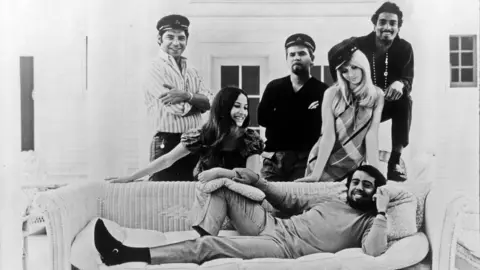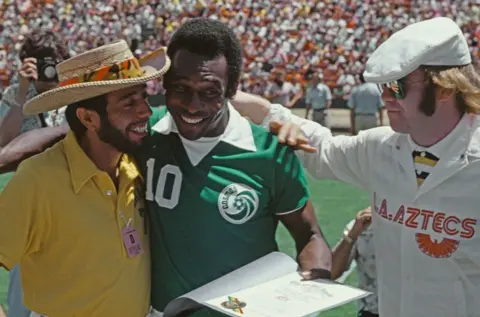ARTICLE AD BOX

 Getty Images
Getty Images
During the late 1960s, Sérgio Mendes was the biggest-selling Brazilian artist in the world
Brazilian musician Sérgio Mendes, who helped popularise bossa nova and samba with Western audiences, has died at the age of 83, his family has confirmed.
The bandleader and composer is best known for the buoyant Latin pop hit Mas Que Nada, and putting Brazilian twists on English songs such as The Look Of Love and The Beatles' The Fool On The Hill.
Mendes recorded more than 35 albums, many of which went gold or platinum in the US; and received an Oscar nomination in 2012 for co-writing the song Real in Rio from the animated film Rio.
A statement from his family said Mendes "passed away peacefully" on Thursday in Los Angeles, surrounded by his wife and children.
No official cause of death was given, however the family said Mendes had been suffering with long-term Covid, and the musician was known to have suffered respiratory problems since the end of 2023.
The family's statement said Mendes "brought the joyous sounds of his native Brasil to the world".
"Mendes last performed in November 2023 to sold out and wildly enthusiastic houses in Paris, London and Barcelona.
"For the last several months, his health had been challenged by the effects of long-term COVID."
The statement concluded by saying Mendes "leaves us with an incredible musical legacy from more than six decades of a unique sound".
Sun-kissed hits
The son of a physician, Mendes was born in Niteroi, Brazil, and initially studied classical piano, with the intention of becoming a concert pianist.
But his life changed in 1956 when he heard his first jazz record, Take Five by the American musician Dave Brubeck, and abandoned his studies.
"For me that was like, I would say, one of the incredible moments of my life," he told US radio station NPR in 2014, "because when I heard that, I had no idea about jazz or anything".


The star played Glastonbury in 2013
He started playing in nightclubs in Rio de Janeiro, just as the bossa nova craze hit - and began to immerse himself in that scene, alongside other luminaries such as Antonio Carlos Jobim and João Gilberto.
His first recording, Dance Moderno, was released in 1961 on the Philips Records label.
Three years later, he left Brazil for the USA to escape the military dictatorship - but it was not an easy transition.
His Brazilian bandmates returned home, forcing Mendes to form a new group. Called Brasil '66, it featured two American singers, Lani Hall and Karen Philip.
Signed to A&M Records, they hit on a winning formula - jazzy renditions of popular Brazilian songs alongside samba-enriched versions of the hits of the day.
They scored their first major hit with Mas Que Nada, a sun-kissed cover of a Jorge Ben original, full of finger clicks, shimmying shakers and an ebullient chorus that sings of the urge to dance.
There is "something very magical about that chant", Mendes later recalled. "People love that song - everywhere in the world."
It was the first Portuguese-language song to become a global hit; and propelled Brasil '66's self-titled debut album into the top 10 of the US charts.

 Getty Images
Getty Images
Sérgio Mendes and Brasil '66 helped to popularise the sounds of Brazilian pop around the world
Later records saw Mendes perfect his blend of Western melodies and Brazilian rhythms, covering Simon & Garfunkel's Scarborough Fair, and Otis Redding's (Sittin' On) The Dock Of The Bay.
When he covered The Beatles' The Fool On The Hill on the 1967 album Look Around, Paul McCartney wrote Mendes a letter, telling him it was his favourite version of the song.
Although his music was dismissed as "easy listening" at the time, he was hugely popular, playing arena tours and performing at the White House for presidents Lyndon B. Johnson and Richard Nixon.
He was a regular on TV shows alongside artists such as Perry Como, Jerry Lewis, Fred Astaire and Frank Sinatra, with whom he struck up a close friendship.
In the 1970s, he relaunched his band as Brasil '77, but his commercial fortunes waned until the 1983 comeback album, Sergio Mendes, gave him the biggest chart hit of his career - a cover of the Dionne Warwick classic Never Gonna Let You Go.
The success came about almost by accident, as Mendes only added the song to his repertoire at the last minute.
"All the other songs on the album were up and festive. I needed a ballad on the album, just to change the pace a bit," he said in an interview for The Billboard Book of No. 1 Adult Contemporary Hits.

 Getty Images
Getty Images
Mendes, along with Pelé and Elton John, attend a match by the LA Aztecs in Los Angeles, 1977
In 1992, he won a Grammy for his album Brasileiro, which featured several tracks with the young percussionist and singer Carlinhos Brown - now one of Brazil's most prominent musicians.
Among their collaborations was Magalenha - a joyous song powered by the energetic sounds of Bahian percussionists from the streets of Rio - that quickly became a Latin standard.
Two decades later, in 2012, the duo received an Oscar nomination for their work on the Rio soundtrack.

 Getty Images
Getty Images
Will.i.am wrote and produced several songs with Mendes in the 2010s
The inclusion of Mas Que Nada on the soundtrack to Mike Myers' Austin Powers film introduced Mendes to a whole new audience in 1997, and by the early 21st Century, most of his back catalogue had been reissued for new fans.
Around the same time, Mendes began to incorporate elements of hip-hop into his sound, collaborating with the Black Eyed Peas on a new version of Mas Que Nada, and recording songs with rappers including Common and Q-Tip.
Mendes also made a cameo in the 24-hour-long video for Pharrell Williams' Happy; and won a lifetime achievement award at the 2005 Latin Grammys.
A film of his life, Sergio Mendes In The Key Of Joy, was released in conjunction with a new album in 2020 - and he continued playing live until very recently, including an appearance at the London Jazz Festival last October.
Summing up his philosophy of music, Mendes once said: "When I think about Brazilian music the first words that would come to my mind would be joy, celebration, party... I think it is in the spirit of the people in general."
The musician is survived by by his wife, Gracinha Leporace, who sang on many of his records. He also had 5 children.

 2 months ago
12
2 months ago
12








 English (US)
English (US)